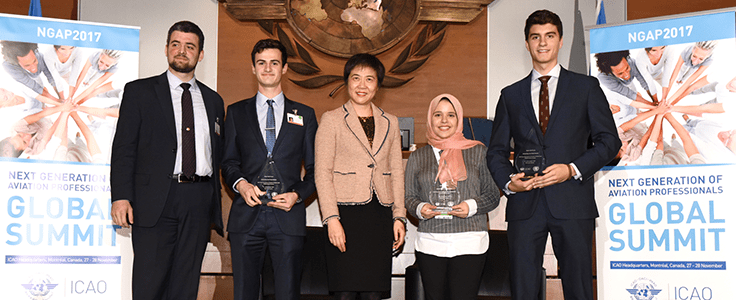At the upcoming Second ICAO Next Generation of Aviation Professionals (NGAP) Global Summit, aspiring aviation professionals will have a crucial opportunity to illustrate their leadership and skills: they will debate with real-life industry decision-makers, government leaders, and academic experts. It will also naturally offer an unparalleled networking opportunity for the participating students. It is taking place from 12-14 December 2018 in Shenzhen, China.
The object of the NGAP Global Summits, and of ICAO’s NGAP programme in general, is to develop strategies to help aviation attract the best and brightest to operate and manage the future air transport network. This is of crucial importance to the sustainable growth of the international civil aviation network, given that air traffic volumes are forecast to double within the next 15 years, provided of course that it is supported with appropriate human, financial, regulatory and physical resources.

This second edition will focus on strategies to accelerate the implementation of the outcomes of the first Summit. That two day event, which attracted over 500 education and air transport leaders from 85 States to ICAO Headquarters in Montréal, recognized the importance of establishing effective dialogue with government education bodies and the aviation sector to develop strategies for promoting aviation and STEM education, as well as the need to develop competent aviation professionals and retain them within States.
The inaugural summit also highlighted the need for facilitating communication and collaboration between States and industry to develop NGAP strategies for engaging and cultivating the next generation of aviation professionals, as well as sharing best practices, and for ICAO to collaborate with education and research institutions for the development of guidance and tools to enable States to determine their future needs and to develop strategies to engage the next generation of aviation professionals, among others.
The importance of this work was highlighted by ICAO’s Secretary General, Dr. Fang Liu. “My colleagues and I are very determined to attract, educate, train and retain the best and the brightest that our coming generations have to offer to manage the growth of the global air transport network,” she declared in her opening remarks. “By 2036, some 620,000 pilots will be needed across our global network, and no less than 80% of these aviators will be new pilots not yet flying today. A similar story is playing out with respect to the future air traffic controllers, cabin crew, maintenance personnel and other skilled technicians needed.”
My colleagues and I are very determined to attract, educate, train and retain the best and the brightest that our coming generations have to offer to manage the growth of the global air transport network.
Among the concrete solutions proposed during the event was the need to establish a network of educational institutions to support related youth attraction initiatives and related research and analysis on sector-wide human resources development metrics.
Dr. Liu further underscored that modern aircraft carry over half of the 1.4 billion tourists who travel across international borders each year, a contribution which establishes air transport as a veritable economic lifeline for many cities, States and regions.
“The availability of safe, secure and ICAO compliant aviation operations is being increasingly recognized today as a key catalyst for economic development,” she emphasized. “Well-planned aviation modernization and capacity increases will play a critical role in many States’ attainment of the UN Agenda 2030 Sustainable Development Goals (SDGs).”
ICAO is also encouraging the next generation of aviation professionals to actively support this year’s event, which will feature exhibits by air transport and industry organizations, by either demonstrating their advocacy for aviation development through their attendance of the event, or by participating online through social media. The vibrancy of contributions from those who physically participate in the Summit will no doubt help these young professionals to position themselves as future leaders, while virtual participants will not only enrich their capabilities and understanding of emerging aviation issues, but also positively influence the scope of ICAO’s outreach and own advocacy.

In addition to the Summit and its core objectives of forging more productive and focused links between global aviation and the education and industry sectors, ICAO will again conduct a Model ICAO Forum during the event. Participants of the Forum, aimed at raising college and university-level awareness on the role of ICAO on the international stage, will study global aviation’s challenges, and through a case study competition, propose solutions to a panel of industry experts on unmanned aircraft systems, dangerous cargo, the socio-economic benefits of air transport, and capacity building and aviation security.
This year’s NGAP Global Summit, co-hosted by the Shenzhen Municipal People’s Government of Guangdong Province, the Chinese Society of Aeronautics and Astronautics, and supported by Beihang University, will greatly contribute to ICAO’s efforts to encourage the focusing of educational and training programmes on the needs of the international air transport and its next generation of professionals.
